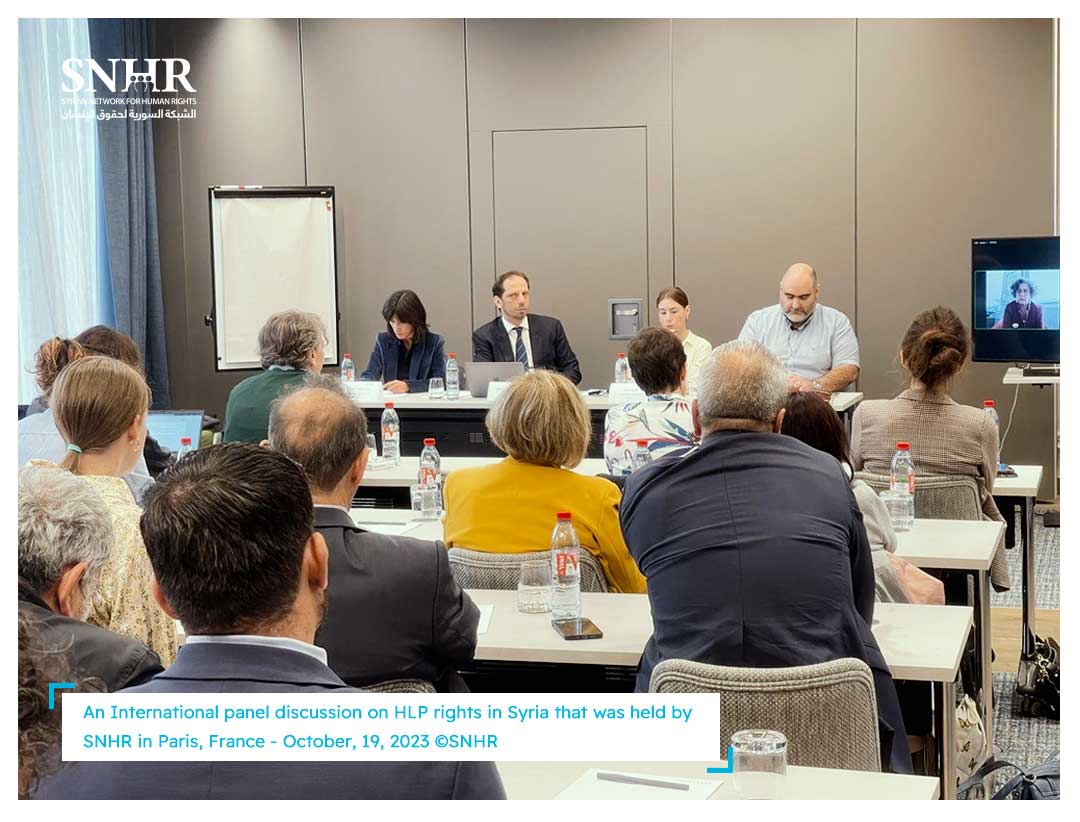France and The UK Assert that Returning Properties to Their Rightful Owners is Essential for a Safe and Voluntary Return for Refugees

Languages
Available In
On Thursday, October 19, 2023, the Syrian Network for Human Rights (SNHR) held an international panel discussion to mark the release of its extensive report entitled, ‘The Mechanisms by Which the Syrian Regime Has Used Laws to Expropriate Tens of Thousands of Homes, Properties and Areas of Land in Homs Governorate’. The event, which was held in Paris, France, featured Brigitte Curmi, France’s Ambassador for Syria; Stefan Schneck, Germany’s Special Envoy for Syria; Anna Burt, the Syria Lead of the UK Mission in Geneva; Fadel Abdul Ghany, SNHR Executive Director; and Marie Forestier, Senior Syria Advisor at the European Institute of Peace (EIP), with the event being moderated by Assaad Alachi, Executive Director of Baytna Syria.
The panel discussion aimed to expose the regime’ practices in relation to its usurpation of HLP rights in Homs governorate by studying the outcomes of the report, which included analysis of the forced displacement and destruction that took place. The panel also submitted recommendations to stakeholders, including international organizations and governments, on how to address HLP rights violations in Syria and support affected individuals and communities, while at the same encouraging active international parties to increase their efforts in documenting violations of HLP rights in Syria, and supporting accountability and justice for the victims of these violations.
Mr. Alachi opened the event by welcoming the attendees and briefly summarizing its themes and goals, before yielding the floor to Ms. Curmi, France’s ambassador to Syria.
The French diplomat began her address by underlining the vital importance of and the integral role played by SNHR’s extensive reporting in this field, stressing that the Syrian regime has enacted many laws to establish a legal framework for expropriating properties, with HLP rights violations affecting over half of all Syrians. She added that it is vital to find mechanisms to help Syrian internally displaced persons (IDPs) and refugees to preserve their rights and prove their ownership, and stressed that the Pinheiro Principles on Housing and Property Restitution for Refugees and Displaced Persons must be respected. Moreover, Ms. Curmi underlined that the international community must work together to find ways and mechanisms to protect properties, a key objective for creating the conditions for a safe and voluntary return for Syrian refugees and IDPs.
In her address, Ms. Burt, the Syria Lead of the UK Mission in Geneva, highlighted the importance of protecting HLP rights in Syria. She stressed that SNHR’s report breaks down the mechanisms used by the Syrian regime to take over properties in a clear and important way. Additionally, she noted that while the conversation around ensuring a safe and voluntary return for refugees usually revolves around violations involving arbitrary arrest, murder, and the poor humanitarian situation in Syria, working on the HLP rights issue in Syria shows the complexities of the IDPs’ and refugees’ situation in Syria with respect to a safe return. She concluded her address by highlighting the efforts of the UK Mission in Geneva towards implementing resolution 2254 and supporting the work of the Independent International Commission of Inquiry on the Syrian Arab Republic (COI), while reiterating the importance of supporting active civil society organizations in order to bring about justice and accountability.


